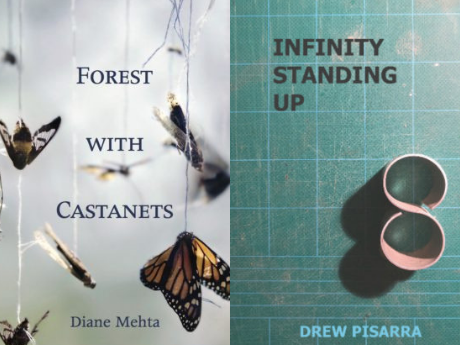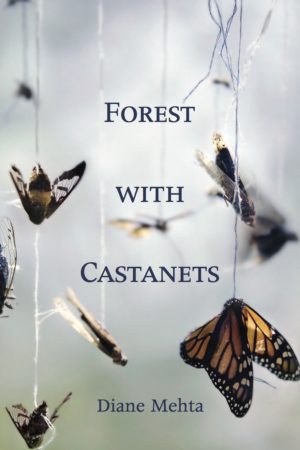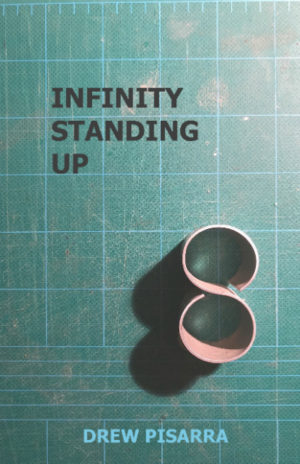Interviews
Talking About The Sonnet: Diane Mehta and Drew Pisarra

The sonnet may be the poetry world's answer to the waltz: a tried-and-true form that people tend to write off as stuffy until they realize that a song they love is actually written at least partly in 3/4 time. Think Led Zeppelin's "Kashmir" or Aretha Franklin's "I Never Loved a Man the Way I Loved You." Not so stodgy now, right? Making the sonnet dance again has become something of an American tradition, too, one that extends from Edna St. Vincent Millay to Terrance Hayes then beyond in both directions. Adding their own voices to the chorus are Diane Mehta (Forest with Castanets) and Drew Pisarra (Infinity Standing Up), two poets with debut collections that feature this reliable old form in surprisingly new ways. Below they discuss how they ended up working in a sonnet series and why it suited their material so well.
Diane Mehta: What was your strategy for the sonnet in Infinity Standing Up and what brought you to it?
Drew Pisarra: Well I was brought to the form because I was in love with somebody and the sonnet struck me as the best form for a love poem. I wanted to show my love to this man and writing sonnets was the obvious choice. What I wasn't expecting was how I kept returning to the sonnet each time we split up whether I was angry or pissy or depressed. Because, I slowly realized that the sonnet is a useful vehicle for the lover's lament as much as it is for any expression of love. I must say, it was nice to see how adaptable it was as a form.
Diane Mehta: Do you find that that when you insert yourself inside the form, the form takes you over? That's what's compelling about the sonnet to me. I fell into sonnets not because I wanted to write about love, but because I wanted to write about frustration. Sonnets offered a certain structure in which you can shove all of your zigzag feelings into. You can move back and forth between the overlapping emotions of love and disappointment and hate and despair and the sonnet holds everything almost like a machine with moving parts—it fits together and holds it in even when you can't.
Drew Pisarra: Totally. You know I was just reading the sonnets of Edna St. Vincent Millay and some of her most playful ones are those in which she's flipping the bird to somebody or when she's divorcing herself from her muse in a way that frees her from their charms or acknowledges that this particular affair is just going to be temporary so let's just cherish this moment, shall we?
Diane Mehta: Why did you choose to work primarily with Shakespearean sonnets?
Drew Pisarra: It seemed like a good starting place, frankly. I almost forgot this but five years ago, I decided to read all of Shakespeare's sonnets by tweeting about one sonnet per week.
Diane Mehta: You tweeted your thoughts about that sonnet?
Drew Pisarra: For three years. 140 characters at a time. And what was a surprise to me was how many of those poems were complaints. He is not the happy lover at all. So after that I read Elizabeth Barrett Browning's Sonnets from the Portuguese, which are more caught up in a spirit of worshipful adoration that borders on the religious. There's something almost prayer-like about her language and rhythms.
Diane Mehta: Maybe the reason why love doesn't come to mind, for me, when I think about sonnets, is because I'm so focused on the way you can move towards or away from something (say, love) in the rhythm. In Seamus Heaney's Glanmore Sonnets, the rhythm is intense and charged; it cuts up lines and moves across sentences. So the pacing is different at the beginning versus the end, when the sentence wraps around to its conclusion. It's the same in John Donne's Holy Sonnets, on which my Unholy Sonnets riff. So while the sonnet has a prescribed rhythm, part of the fun is in torqueing or breaking it.
Drew Pisarra: Well I like both learning rules and then breaking them.
Diane Mehta: So it's supposed to be in standard English-language iambic pentameter, and use either a Shakespearean or Petrarchan format and rhyme scheme. The latter has a turn, you have to see it as a logical and tonal shift. But for me that feels so manufactured. When I first started writing sonnets, I was just experimenting with form, I remember thinking, okay, you have to keep balancing and rebalancing the line because all you're doing is stitching together the rhyme all the time. And each time you don't find a rhyme that fits, you have to unravel everything before it or, alternatively, create something altogether new. So that reshapes your thoughts. Of course you can argue that it gives your thoughts structure, but I find that can be constraining.
Drew Pisarra: When I bumped up against the same obstacle, I actually found that it forced me to open my mind to what my deeper thought was, so if I went in with a specific idea and I couldn't find the rhyme, well, then I had to ask myself: What else am I thinking? The enforced rhyme scheme acted like a probe in my brain where it triggered thoughts that were more deeply buried or not initially considered.
Diane Mehta: Right, like, what else is my head that I don't want to admit to myself?
Drew Pisarra: Yeah, completely. It pushed back at me, insisting I dig deeper. I felt that even more so with Petrarchan sonnets than Shakespearean ones because the rhyme scheme felt less predictable. There's something about a-b-b-a that's less sing-songy than a-b-a-b even if the challenge of it made me want to pull my hair out.
Diane Mehta: Do you have an even number of Shakespearean and Petrarchan here? Yours are very tight. And you don't see it, you don't read it, you don't hear it if there's a rhyme in there. The meter that you're attaching yourself to it just flows naturally. You've done it very understatedly in a way that works.
Drew Pisarra: Well, I'm glad to hear that!
Diane Mehta: Once you get into the structure, once you've adapted to it, the form itself becomes somewhat compulsive, doesn't it? You want to crank out more because you can feel the rhythm inside you. And I feel like the edges of the line are these jagged places that you do these dances around, and that you plunge off a cliff, you start in the beginning of the next line, and then you stop abruptly and move ahead, which mimics the way I was feeling, so it hopefully feels very lifelike. And rhymes help make the rhythm, but the timing is different because they're not pure rhymes at the end of lines, they're off-rhymes, tilt rhymes, and slant rhymes within the lines.
Drew Pisarra: Right. I was going to say there's not an abandonment of rhyme.
Diane Mehta: Never. I love rhyme.
Drew Pisarra: I do too. It creates a sense of play for the listener then gives the memory something to hold on to afterwards. I could feel that in your sonnets, especially when they'd deliver that unexpected couplet at the end. Was that deliberate?
Diane Mehta: Like I want to sum up and make it dreamy, as if there really is some structure in these chaotic feelings, or just in life. Or I'll match up words and plunge them into the kind of line that's full of repetitions and varied repetitions that have the same feeling of the rhyme. You ask me earlier whether I'm abandoning everything but I don't feel like I am. What I am not writing, which is lately seems in vogue, are prose. I'm actually sticking to the 14-line structure as a kind of moving ribbon.
Drew Pisarra: In the sonnet series in your book, I like how the old peeks through the new by having the rhymes pop up, so it's like, "We're still here!" Plus I noticed these sonnets were very much about acknowledging a "now" that just happened, and not about something further back in time. In the rest of Forest With Castanets, there's a lot of stuff about your mom that feels more like looking into a distant past. But these sonnets feel more immediate.
Diane Mehta: These are very in-the-moment. I'm a big fan of the way the 17 century religious poets use physical or profane love as a metaphor for divine. Donne, Gerard Manley Hopkins, and George Herbert—they are all expert at ratcheting up the tension between self-doubt and devotion by being utterly in the present and moaning to God about the torture they are in. Mine work with the same principle, on purpose. I have lots of other poems about loss and longing, too! But those I usually fit into my obsession with time and the galaxy and something bigger (something unlike God). But there's always this concern about time. To that point, I've been reading Eliot's Four Quartets for 25 years and obsessed with it.
Drew Pisarra: Me too!
Diane Mehta: My mother died when I was young so I have this sense of time being fluid. I feel it more intensely as I grow older. And am constantly looking out to some afterlife or other or universe because that's part of non-time and it has to exist in our real time, which is tactile because we're stuck here but we're these tiny thing but yet—
Drew Pisarra: Yeah but these poems aren't about nostalgia.
Diane Mehta: My sonnets?
Drew Pisarra: Yes. The fifteen sonnets. They have none at all.
Diane Mehta: No. There's just a total sense that I crashed and that this is an empty space outside of time. I didn't really feel "within" time. Looking back on it, it just felt like a bad change of time that was suspended and which didn't exist. And I only existed in the vacant place. Really the only thing there, to keep time together, was the sonnets. That was true no matter how weird or miserable or uncertain I felt at the time—I'd gotten divorced a few years earlier and then had a shabby junky relationship that died and ended up just sitting there wondering what was going to be next. It was a complete reordering of everything for me.
Drew Pisarra: But different.
Diane Mehta: Sadder. Happier. But not knowing what was going to happen to the next half of my life so that was the weird thing—But it contains time. So it's like this stuck moment that's not in time. Meanwhile, it's very much about the rest of the time. I've talked myself into a loop.
Drew Pisarra: Those poems, for me, were so electric. They had an immediacy that reminded me of Thornton Wilder's Our Town.
Diane Mehta: I love Our Town!
Drew Pisarra: How can you not? It's beautiful. There's that part when Emily is dead and she comes back to visit the living, and it's too much. "Do any human beings ever realize life while they live it," she asks and then the stage manager replies "The saints and poets, maybe." That intensity is what we're aspiring to as poets—at least at times. But it can be unsettling, even staggering. Do you think you gravitated to a form because it gave you some sort of structure at a moment that felt overwhelming?
Diane Mehta: Absolutely. The structure of the sonnet holds in those feelings and contains them and can turn them into something beautiful in a way that no other structure can. Couplets can't do it because they're too airy, and they leave. And the same with tercets or thicker stanzas. I could never really write in five- stanzas. I can't shift in and out and feel like it's contained. But with the sonnet you have this tight ball, kind of like a little church, and then everything inside it. You go inside a church and it's there to give you some structure to your life even if it has none except for those hours that you're in church. And you pray and believe and pretend that things are okay because acting makes it okay and maybe what makes it feel is okay is not just the prayer, which is helpful because it's repetitive, but because there are people there, so you have some sort of community. So the sonnet feels like a community—it has been loved and experimented with over time, so it connects you to tradition and history.
The release date for Drew Pisarra's Infinity Standing Up is Feb. 17, 2019; the release date for Diane Mehta's Forest with Castanets is Mar. 4, 2019.




